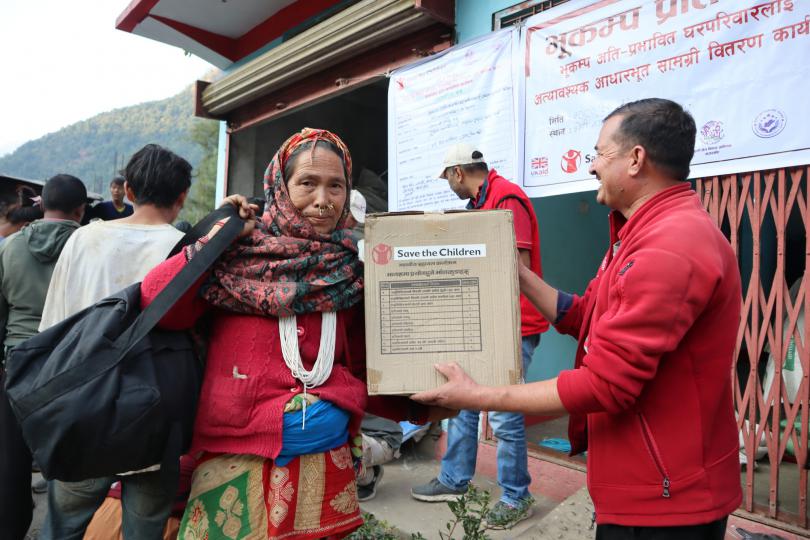Save the Children’s Earthquake Response in Bajhang, Jajarkot, and Rukum West

In October and November 2023, Nepal experienced the devastating impact of two earthquakes, registering magnitudes of 6.3 in Bajhang and 6.4 in Jajarkot and Rukum West. Recognizing the urgent need for support, Save the Children promptly responded, emerging as one of the first organizations on the ground to provide immediate life-saving assistance and humanitarian aid.
Key Interventions:
Immediate Non-food Item (NFI) Support:
Bajhang: Responded within 72 hours, delivering shelter and hygiene kits to 200 households, directly benefiting 3,216 people.
Jajarkot: Initiated response within 36 hours, supporting 556 households with comprehensive aid, including shelter, hygiene, baby kits, and winterization kits, reaching 2,614 people.
Rukum West: Provided immediate life-saving assistance to 186 households, reaching 928 people directly.
Food Support: Distributed essential food items to 715 households, directly benefiting 4,099 people.
Winterization Tents:
On December 6th, 2023, European Civil Protection and Humanitarian Operations handed over 800 life-saving winter tents to Save the Children to distribute to the earthquake impacted areas of Jajarkot and Rukum West. Fire retardant and waterproof winterization tents, equipped with stoves, and a total living area of 23 square meters has been provided to earthquake impacted communities.

“The winterization tent is like a ray of hope for people like us who had given up! I feel safe for myself and my son.” – Laxmi, Jajarkot earthquake survivor.
Shelter:
- Distributed tarpaulins and winter tents, and facilitated the establishment of transitional shelters through cash vouchers, and deployed experts to support rehabilitation efforts.
- Trained 20 masons in constructing resilient structures for future shocks, as per the government building codes.

Education:
Supported 120 Temporary Learning Shelters (TLS), providing education kits to 4,000 students and teacher kits to 255 educators.
Assisted 95 Early Childhood Care and Development (ECCD) centers and 142 schools with ECCD and school kits, preventing educational disruption.
Protection:
Established 8 Child-Friendly Spaces (CFS) in earthquake-affected areas of Jajarkot and Rukum West, creating a safe environment for children to play and learn.
Provided psychosocial first aid and counseling services to 460 individuals through trained committee members and community psychosocial workers.
Distributed 200 Dignity Kits.
WASH:
Distributed hygiene kits, constructed 900 temporary toilets, and engaged in hygiene promotion through local radios.
Risk Communication and Community Engagement (RCCE): Activated RCCE initiatives disseminating information on post-earthquake safety and protection, violence prevention, water purification, handwashing, menstrual hygiene, mental health, and shelter construction through local and national radio stations.
Our key approaches:
Multi-Sectoral Programs:
Save the Children adopts a comprehensive approach encompassing shelter, WASH, education, protection, mental health, and well-being. This ensures immediate and long-term support for children and their families, empowering them to rebuild their lives post-disaster.
Collaboration and Stakeholder Engagement:
Save the Children collaborates closely with communities, government, and other agencies at national, provincial, and local levels. As the co-lead for the national education cluster and the Karnali shelter cluster, this collaboration ensures a unified response and effective long-term rehabilitation efforts.

Reaching the Unreached:
Save the Children's commitment extends to the most remote and unreached areas, ensuring no child or family is left behind. Through collaboration with local partners and the government, the organization ensures that even in hard-to-reach areas, children's lives are well-supported, particularly during humanitarian interventions.
Localization in Humanitarian Context:
Save the Children has developed diverse network of partners, including NGOs, government entities, universities, and private sector organizations.
The strategic approach for partners is guided by the Nepal Partner Graduation model.
The core principle of the Nepal Partner Graduation Model is to support partners in enhancing their Organizational Capacity Development, enabling them to progress to higher tiers according to their aspirations.
The collaboration among these partners allows for the exchange of knowledge and expertise.
This model categorizes partners into tiers, ranging from Tier A (professionalized agencies needing minimal oversight) to Tier C (more informal, community-based groups requiring additional supervision and capacity-building).
